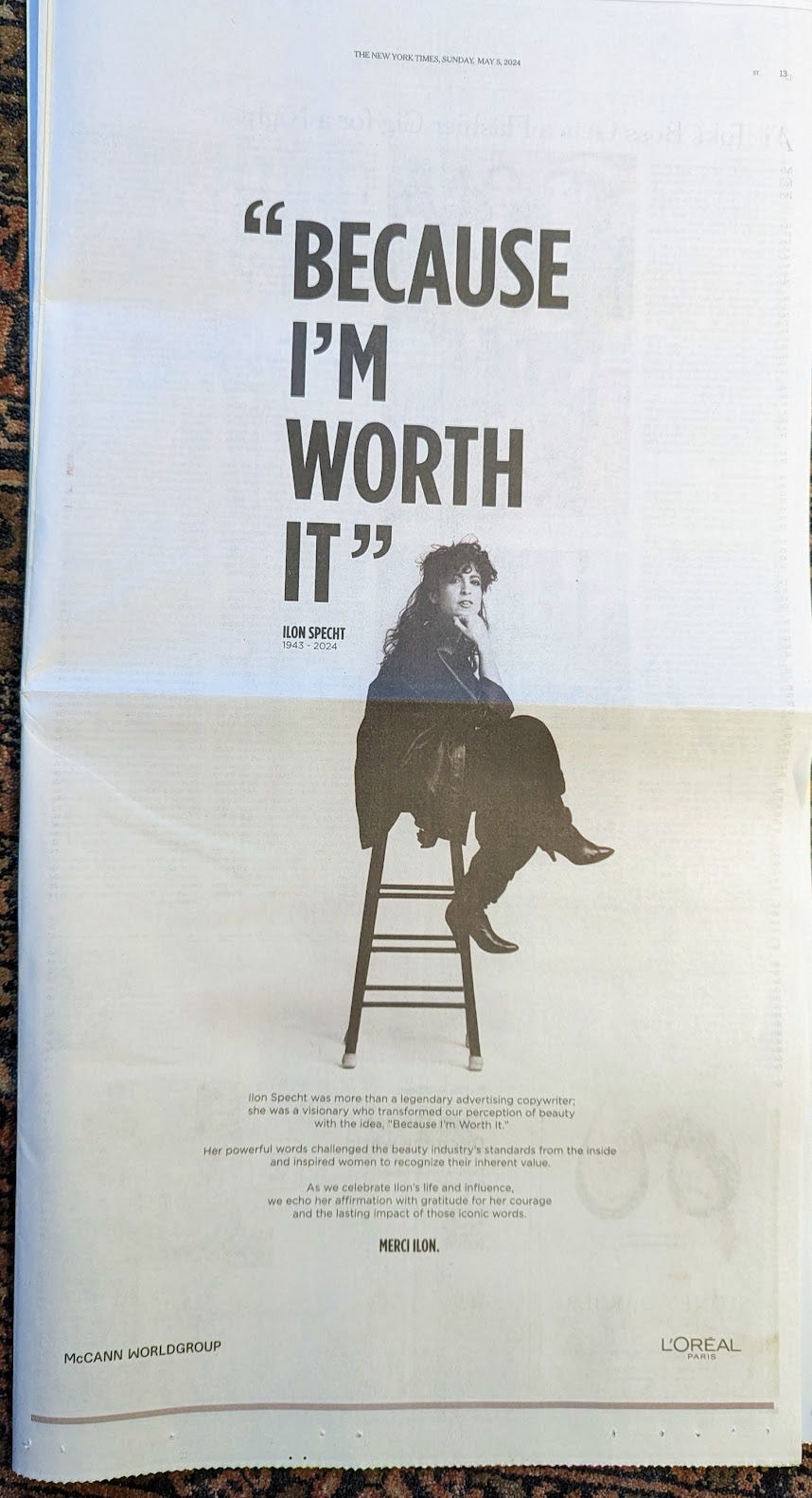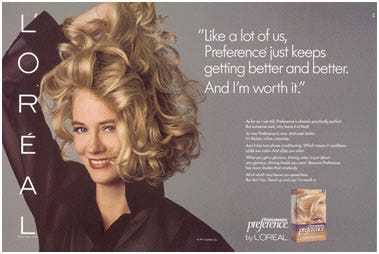Ilon Specht, the Madison Avenue copywriter and creative director who wrote the L’Oréal slogan “Because I’m worth it,” died April 20, 2024, one day after her 81st birthday.
The slogan, which made its first appearance in 1973, became one of the most enduring taglines in advertising history. It has been translated into 40 languages, and L’Oréal has used it continuously, changing only the pronoun, over the years, from “I” to “we” to “you.” “Because you’re worth it” is now the tagline for the entire L’Oréal family of brands. Along with McDonald’s “You deserve a break today,” introduced in 1971, L’Oréal’s slogan ushered in the you deserve it/you’re worth it advertising era, in which products and services are rewards rather than solutions to problems.
The story of Specht’s contribution to advertising history is legendary. When Malcolm Gladwell profiled Specht for The New Yorker in 1999, he wrote that the executives at McCann-Erickson (now McCann Worldgroup) were in a panic because the L’Oréal campaign they’d chosen had been scuttled just before it was scheduled to run. Specht was still a junior copywriter:
“We were four weeks before air date and we had nothing—nada,” Michael Sennott, a staffer who was also working on the account, says. The creative team locked itself away: Specht, [Ira] Madris—who was the art director on the account—and a handful of others. “We were sitting in this big office,” Specht recalls. “And everyone was discussing what the ad should be. They wanted to do something with a woman sitting by a window, and the wind blowing through the curtains. You know, one of those fake places with big, glamorous curtains. The woman was a complete object. I don’t think she even spoke. They just didn’t get it. We were in there for hours.”
Gladwell went on, quoting Specht:
[“]I could just see that they had this traditional view of women, and my feeling was that I'm not writing an ad about looking good for men, which is what it seems to me that they were doing. I just thought, Fuck you. I sat down and did it, in five minutes. It was very personal. I can recite to you the whole commercial, because I was so angry when I wrote it.”
And then, lowering her voice, Specht proceeded to recite the commercial:
“I use the most expensive hair color in the world. Preference, by L’Oréal. It's not that I care about money. It's that I care about my hair. It's not just the color. I expect great color. What's worth more to me is the way my hair feels. Smooth and silky but with body. It feels good against my neck. Actually, I don’t mind spending more for L’Oréal. Because I’m”—and here Specht took her fist and struck her chest— “worth it.”
One of the original “Because I’m worth it TV” commercials (1973)
In many accounts of this story, including Gladwell’s, Bustle’s, L’Oréal’s, and British Vogue’s, Specht is 23 years old when she makes this creative breakthrough.1 Remarkable Women Stories gives her birth year as 1948, which would have made her 24 or 25 in 1973.
But Specht had a habit of lying about her age, often to appear older than she was. After graduating from Long Beach High School in Southern California she talked her way into UCLA; she later claimed she’d been just 15. She dropped out, moved to New York, and landed her first ad-agency job, at Young and Rubicam, in 1966, where she wrote a memorable spot for the Peace Corps. Was she 18 then, as she would later tell people? Or had she started fudging her age to seem younger, and was she in fact 24 or 25?
Or maybe even older?
A full-page ad in the April 30, 2024, edition of the New York Times, taken out jointly by McCann and L’Oréal, gives her birth year as 1941, which means she would have been 32, not 23, in 1973.

The death notice posted by her family on a funeral-home website gives a full birth date: April 20, 1941.
I clicked through that death notice to watch a video of the graveside ceremony held in Providence, Rhode Island, on April 25. Specht’s son — if his name was mentioned, I didn’t catch it — gave a funny and touching eulogy for his mother, whom he referred to as Ilon (pronounced ee-LAWN). He spoke not only of her work for L’Oréal, but also of the product name and ad campaign she created with Cathy Cook for Underalls, a women’s underwear brand from Hanes. The cheeky slogan was “Show us your Underalls!”, and Specht made the underwear “tilt and beep,” he said. (See for yourself is in this 1978 TV commercial.)
He also told the story of Specht’s being sidelined by a buyout of the agency she helped build, Jordan McGrath, that had been “plotted by the Old Guard and recent players, all men, while she was out with her first cancer scare.” To add insult to injury — literally! — the agency wanted her to provide autobiographical copy for a promotional brochure.2 She felt “too betrayed and angry to do it,” and so her son took over:
I wrote it openly, as a son, and it ran with my childhood drawing of her next to a screen, displaying a big butt, my depiction of her creating an Underall that in retrospect I realize was a fuck you to the men who misused my mom, delivered by a smiling 20-something — as close as I could get to being her, she who had delivered a slogan in the guise of a sales pitch more than 20 years earlier.
Like mother, like son.
I’ve been searching every day, but I still haven’t seen an obituary for Specht in any newspaper of record. I’m hoping that at least one is in the works, and that it tells even more stories about this remarkable woman. Her life and legacy are certainly worth it.
UPDATE: Thanks to reader Will Leben for pointing me to this New York Times obituary, published May 10. (Gift link)
The L’Oreal website says she was “a young 23-year-old.” As opposed, I’m guessing, to one of those elderly 23-year-olds who don’t dye their hair.
Dear women readers: Raise your hand if this scenario sounds painfully familiar.





Thank you for highlighting and recognizing this remarkable woman.
You’re not kidding about our shared interests! Been stewing on the impact of Ilon since I read about her loss in the Times last week. Thank you for this!